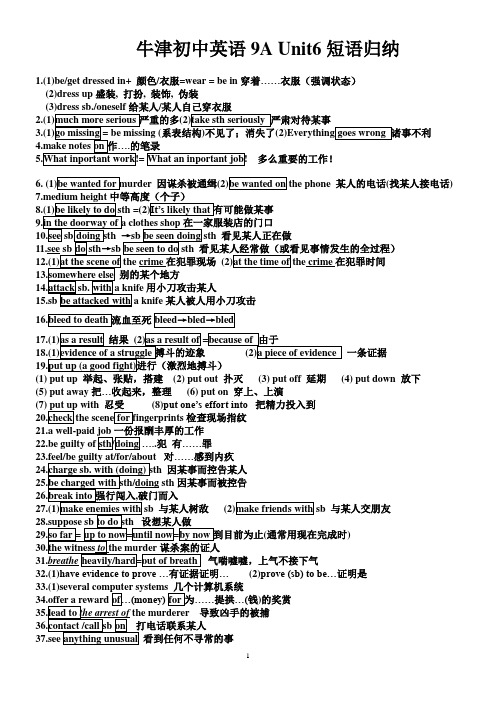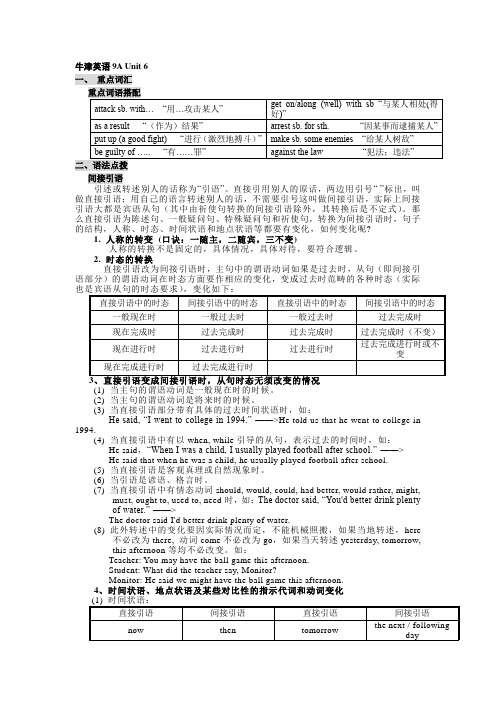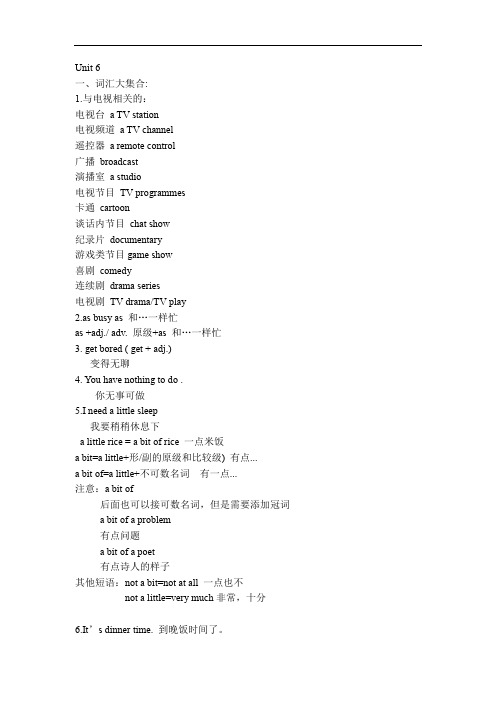牛津初中英语9A_Unit6知识点归纳汉语
牛津初中英语9A_Unit6知识点归纳

牛津初中英语9A Unit6短语归纳1.(1)be/get dressed in+ 颜色/衣服=wear = be in穿着……衣服(强调状态)(2)dress up盛装, 打扮, 装饰, 伪装/多么重要的工作!因谋杀被通缉某人的电话(找某人接电话)看见某人正在做(2)at the time of the crime在犯罪时间一条证据扑灭(3) put off 延期(4) put down 放下(5) put away把…收起来,整理(6) put on 穿上、上演(8)put one’s effort into把精力投入到检查现场指纹…..犯有……罪与某人交朋友(通常用现在完成时)…(2)prove (sb) to be…证明是……提拱…(钱)的奖赏导致凶手的被捕看到任何不寻常的事做些违反法律的事言行反对某人发生,举行第二天呼出,发送出(情态动词)42.(1) dare to go out alone at night 敢独自一个人夜里出去时间快用完了(2)take/have a shower/bath 洗澡notice sb do /doing sth(经常/正在)排队等候35岁时30几岁时(复数)熟悉有/没有犯罪记录因盗窃入狱六个月还(包含)(2)make a living 谋生65.(1)…而震惊(2)live next door住在隔壁因某事而逮捕某人(主动因为某事而被逮捕(被动)举行写作竞赛(外貌或性格)回答:? 她喜欢什么?She likes apples/cartoons.替某人致谢语法:直接引语和间接引语当我们引用别人的话时,可以用别人的原话,也可以用自己的话把意思转述出来,如果是引用原话,被引用的部分就称为直接引语,如果是转述,就称为间接引语。
如:A. The detective asked: “Who knows the victim?”,其中的“Who knows the victim?”就是直接引语。
】牛津初中英语9A-Unit1--Unit6知识点归纳

牛津初中英语9A_Unit1--Unit6知识点归纳牛津英语9A Unit 31. 你允许他使用你的电话吗?D o you ____________ him to use your telephone?1. 请回答我的问题。
Please____________my question.2. 她头没抬,也不回答。
She didn’t lift her h ead, and made no___________.二、语法点拨1. 动词不定式动词不定式是由“不定式符号to+动词原形”构成的一种非谓语动词结构。
有些动词不定式不带to,动词不定式可以作句子的主语、表语、宾语、定语、补语、状语或单独使用。
不定式保留动词的某些特性,可以有自己的宾语、状语等。
动词不定式和它后面的宾语、状语等一起构成短语,叫作不定式短语。
(1)作主语It is + adj.(形容词)/n.(名词)+ (for sb.) + to-v (动词不定式)It is our duty to try our best to deal with each challenge. 尽力处理每个挑战是我们的职责。
(2)作表语主语+ be + to-v (动词不定式)My dream is to become a policeman. 我的梦想就是当一名警察。
(3)作宾语①主语+ vt. (He prefers to eat rice.②主语+ vt. (Don’t forget to bring your book next time.③主语动词不定式)I find it difficult to remember everything.我觉得记住每一件事是困难的。
④主语动词不定式)I don’t know whether to go there.(4)作定语不定式在句中作定语,置于被修饰的名词或代词之后。
不定式短语作定语和被修饰词之间表示以下关系:①表示将来的动作。
牛津英语9A Unit 6

牛津英语9A Unit 6做直接引语;用自己的语言转述别人的话,不需要引号这叫做间接引语,实际上间接引语大都是宾语从句(其中由祈使句转换的间接引语除外,其转换后是不定式)。
那么直接引语为陈述句、一般疑问句、特殊疑问句和祈使句,转换为间接引语时,句子的结构,人称、时态、时间状语和地点状语等都要有变化,如何变化呢?1. 人称的转变(口诀:一随主,二随宾,三不变)人称的转换不是固定的,具体情况,具体对待,要符合逻辑。
2. 时态的转换直接引语改为间接引语时,主句中的谓语动词如果是过去时,从句(即间接引语部分)的谓语动词在时态方面要作相应的变化,变成过去时范畴的各种时态(实际(1) 当主句的谓语动词是一般现在时的时候。
(2) 当主句的谓语动词是将来时的时候。
(3) 当直接引语部分带有具体的过去时间状语时,如:He said, “I went to college in 1994.” ——>He told us that he went to college in 1994.(4) 当直接引语中有以when, while引导的从句,表示过去的时间时,如:He said,“When I was a child, I usually played football after school.” ——>He said that when he was a child, he usually played football after school.(5) 当直接引语是客观真理或自然现象时。
(6) 当引语是谚语、格言时。
(7) 当直接引语中有情态动词should, would, could, had better, would rather, might,must, ought to, used to, need时,如:The doctor said, “You'd better drink plentyof water.” ——>The doctor said I'd better drink plenty of water.(8) 此外转述中的变化要因实际情况而定,不能机械照搬,如果当地转述,here不必改为there, 动词come不必改为go,如果当天转述yesterday, tomorrow,this afternoon等均不必改变。
译林版牛津英语9A-Unit-6-知识点解析

Unit 6 TV programmers 电视节目Unit 6 练习题Ⅰ.根据句意及首字母或汉语提示完成单词1. Congratulations(祝贺)to you on winning the first p________.2. Sports World c_________up-to-date sports news around the world at 10:00 pm.3. Students are getting ready for the c_______sports meeting.4. Feng Xiaogang is my favourite _________(导演).5. Waiting for him here is just a w________of time.Ⅱ. 用所给词的适当形式填空6. There are some children_______(swim) in the river.7. I saw some people_________(run) out of the supermarket when I walked past it.8. His parents will be worried if he__________(not come) back on time.9. Nobody can stop him from_________(try) out the new idea.10. The film__________(direct) by Li An is quite wonderful.Ⅲ.句型转换11. I watch TV three times a week.(对画线部分提问)________ you watch TV?12. She has joined the Art Club.(改为同义句)She is ___________ _________ the Art Club .13. Nothing is more important than life in the world, so we must prevent all the accidents like these .(改为被动语态)Nothing is more important than life in the world, so all the accidents like these _______ ______ ________.14. You shouldn’t arrive late for class.(改为祈使句)_______ for class.15. You can’t use my computer unless you get my permission.(改为同义句)You can’t use my computer _______ you_______ _________my permission?Ⅳ.根据汉语意思完成句子16.“难道你不认识他吗”“是的,我不认识”---________you know him?---_______, I________.17.篮子里装满了鸡蛋。
牛津版9A chapter 6章节知识点

9A chapter 61.be full of 装满;放满;充满The bottle is full of water.=The bottle is filled with water.2.keep sb. /sth. +adj 使保持某种状态Please keep the door closed.3.make sb. do sth. 使/让某人做某事He often makes his brother cry but this time he is made to cry by his brother.4.move 移动;搬动The desk is too heavy for the boy to move.迁移;搬家We will move into the new house next month.使感动I was moved to tears at the story.5.leave v.离开;剩下;留下;留置;听任;忘记The bus leaves the station in five minutes. May I leave my school bag here?The window was left open. I left my umbrella in the bus.n.许可;休假;告别Can I ask for a three days’ leave?6.have an effect on 对…有影响The book has a great effect on the children.affect v. 动词7.add to/into Please add the relish you like yourself.8.fool v.愚弄;欺骗foolish adj.愚蠢的;傻的n. 傻子You can’t fool me! I don’t believe you. Why are these men so foolish? She was a completely a fool.9.enough pron.足够;充分I have had enough, thank you.adj.充分的;足够的They have enough rooms for everyone.adv.充分地;足够地The room is big enough to hold fifty people.10.kidnpa vt.绑架;诱惑 A rich man was kidnapped on his way home last night.11. go out 出去;出国Let’s go out for a walk.(灯;火)熄灭The fire went out gtadually.(衣着;式样等)不时兴,过时了My clothes go out of date.12.own adj 自己的I saw it with my own eyes.v. 有;拥有The old man used to own a lot of houses.owner n 所有人;物主She is the owner of the house.13.colour v.给…着色n.颜色He coloured the wall white. What colour is it?14.in this way 这样;用这种方法You can do it in this way.in a way 在某种程度上In a way,he was sorry about that.in the way阻碍;造成不便The traffic is busy. You shouldn’t be in the way.by the way 顺便说;顺便问By the way, who won the game?15.welcome v. 欢迎Welcome your friends to my home.adj.受欢迎的You’re a welcome guest.n.欢迎I think they’ll give us a warm welcome.感叹词Welcome to Shanghai. You’re welcome. 不客气16.at times 每次;一次The boat can take six people at a time.at that time “那时”常用于一般过去时或过去进行时They were on an island at that time.17.take off 脱下put on 穿上起飞The plane took off five minutes ago.18.escape 常与from或out of 连用Two of the prisoners have escaped from the prison.escape+n./v-ing There is no way to escape doing the work.19.free①自由的The old lady leads a free life and never troubles much about anything.②免费的We enjoy free treatment care.③空闲的I’m free on Saturday.④未被占用的Have they any rooms free?20.belong to 属于This car belongs to me. Who does this TV set belong to ?21. burst into 突然发生She burst into tears.=She burst out crying.burst out doing sth. 突然发生22.at the beginning of 在…之初Please read the text from beginning to end.He will go to England at the beginning of next month.23.on one’s own 独自地;主动地He did the work on his own.24.不可数名词数量时,常用“数词+单位名词+of +不可数名词”a piece of paper two pieces of paper a teaspoon of soup three teaspoons of soup25.take①拿;握住;抓住The mother took her child by the hand.②乘坐;搭(车,船)We took the bus to Beijing.③吃;喝;服用You must take the medicine three times a day.④花费(时间)需要;持续How long does the flight take?26.drop v. 落下;掉下The girl dropped the cup.drop by 请问;拜访He often drops by Tom’s .27.space 间隔;太空;空间He was the first man to walk in outer space.28.provide sb. with sth.=provide sth. for sb. 为某人提供某物Mr Smith provided food for us.=Mr Smith provided us with food.随堂测试1.—May I have another cake?—You’d better not. You shouldn’t go swimming on a________stomach.a.hotb.hungryc.fatd.full2.Look out! The cup is ______hot water.a.full ofb.fill withc.fulld.filled3.The earth is out home.We must______the land, air and water clean.a.getb.letc.keepd.take4.The heavy snowstorm made the mountain climbers_________halfway.a.stopb.to stopc.stoppingd.stopped5.Lin is going to________from Tai’an to Dalian after high school.a.startb.movec.setd.take6.After the earthquake, we heard of a lot of_________stories, and all of us were deeply _______.a.moving; movedb.moving;movingc.moved;movingd.moved;moved7.—Thanks for your wonderful dinner.I have to go now.—It’s raining hard. Don’t _______until it stops.a.arriveb.stayed.leave8.—Where is my handbag?—Maybe you have________it in the shoe shop.a.gotb.forgottenc.thrownd.left9.The boy read the article_______and found something important in it.a.careful enoughb.carefully enoughc.enough carefuld.enough carefully10.Look at the flowers! They are in different ________;red,yellow, pink….a.coloursb.sizesc.pricess11.—I want to go to different places,but I don’t know the _______.—A map is helpful,I think.a.priceb.wayc.timed.ticket12.—I’ve never had such a wonderful time.Thank you for asking me.—_________.a.Good jobb.That’s itc.That’s rightd.You’re welcome13.—__________has your uncle been to Canada?—Only twice.a.How many timesb.How oftenc.How longd.How soon14.The plane from Shanghai to Paris will ________in an hour.a.take upb.take awayc.take outd.take off15.Everyone knows that Taiwan belongs ________China.a.forb.toc.withd.about16.—I thought you had_________English.—No.It has been useful in my work.a.studiedb.droppedc.falledd.passed17.He_______us with the information that we needed.a.toldb.gavec.providedd.offered 答案:DACAA ADDBA BDADB BC。
牛津9Aunit6知识点词组句子归纳教学文案

9AU6知识点梳理Welcome to the unit1. boring 令人无聊的amazing 令人惊奇的sur prising令人惊讶的bored 人感到无聊的amazed 人感到惊奇的surprised人感到惊讶的exciting 令人兴奋的interesting令人有趣的excited 人感到兴奋的interested人感到有趣的2.as +adj.或adv原级+as 和...一样...sleepy (adj.) 欲睡的feel sleepy3.sleep(n.或v)asleep (adj.) 睡着的fall asleepReading1.daily (adj.) 每日的weekly (adj.) 每周的monthly(adj.)每月的yearly(adj.)每年的2.up-to-date 最新的=the latest=the newest, 其反义词是out-of-date.3. a number of “许多,大量”,修饰可数名词的复数形式,相当于many,动词用复数the number of “…的数量”,动词用单数4.cover:①vt. “报道” will be covered live 被动,一般将来时的被动结构是:will be +done②vt. “包括”= include5.动词或动词短语修饰名词:①主动关系,用doing形式The road connecting NJ to JR is busy.②被动关系,用done形式I like the songs sung by Jay.6. be full of … = be filled with... 注意介词7. on Earth =in the world 世界上vt. “介意”, mind doing mind sb./ sb’s doing8. mindn. “大脑、精神” in my mind “在我心中” on my mind “挂在心上”9.such as = like10.this week’s programme “本周的节目” ,在时间后加’s ,如:today’s newspapersthis month’s magazine等。
牛津初中英语9A-Unit1--Unit6知识点分部分梳理解读

牛津初中英语9A_Unit1--Unit6知识点分部分梳理UNIT 1Welcome1.bring bring sb. sth=bring sth. to sb. (与take比较2.Worry about = be worried about3.Say, talk, tell,,speakSay (vi. 强调说话内容Talk (vi. talk to sb. about sth.Tell 告诉。
双宾语 tell sb. sth.Speak 说某种语言:正式的演讲,演说4. shoul d①(shall过去时)②情态动词,“应该”,用于第一人称Shouldn’t 不应该5. sb. be familiar with sth.=sth is familiar to sb 某人对某物熟悉6. recommend sb. sth.=recommend sth. to sb. 向某人推荐某物Recommend sb. to do sth. 建议某人做某事7. join +党派,团体(加入并成为一员)Join in 参加某项正在进行的某项活动=take part inJoin sb. in sth. 加入做某事的行列Reading1. divide…into… 把……分成divide…from….把……与……分开2. at times = sometimes 有时3. patient (adj.←→impatient (n. 病人4. give up sth.give up doing sth. = stop doing sth.5. too much 太多 + 名词 much too太 + 形容词6. pay attention to sth. 注意,重视7. be good at = do well in 擅长←→ be weak/bad in8. others ①some… others 一些……另一些②some…the others 一些……其余的(余下的全部)9. differently; different (be different from; difference10. try to do sth. 尽力做某事; try doing 试着做Vocabulary1. spend, pay, cost ,takespend (主语为人spend…(in doing sth. 花费……做某事spend… on sth 在某物上花费……pay(主语人)pay money for sth. ;pay sb. some moneycost(主语物)sth. cost sb. some moneytake. It takes sb. some time to do sth. 做某事花费某人……时间2. explain sb. sth. = explain sth. to sb. 向某人解释某事3. show off 炫耀,卖弄(代词放中间)Grammar1. It is + adj.(品质 + of sb. + (not to sth.(careless, clever, foolish, good, kind, nice, silly, generous, confident 2. It is + adj. (不定式的特征+ for sb. + (not to to do sth.(easy, different, hard, important, necessary, interesting, impossible 3. sb. be (not + adj. + enough + to do sth. 某人(不足够……做某事与so…that…; too…to…4. at all times 随时,永远(常在句末)5. have sth. done 使某事被做; have sb. to do sth. 让某人去做Skills1. have success in (doing sth. = succeed in (doing sth.adj. successful2. have problems with sth.=have problems (difficulty/trouble in doing sth.3. make predictions 做预测4. have fun (in doing sth. 做某事开心5. come up with 找到,提出(解答)6. be afraid of doing 害怕做 be afraid to do 因害怕而不敢做7. mind +doingUNIT 2Welcome1. there’s nothing wrong with…=there isn’t anything wrong with…(anything, something,everything,nothing, somebody, anybody, somewhere, anywhere 形容词位于这些不定代词后2. sth. looks +adj. (good on sb 某人穿……很(好看)Reading1. sleepy, asleep, sleep2. be good/ bad for 对……有好处︱坏处be goo to 对……亲切 be good at3. sad, sadness, sadly4. cheer sb. up=cheer sb. up 使……振奋起来,高兴起来5. remind : remind sb. of sth. 提醒某人某事remind sb. (not to do sth.6. have difficulty (in doing sth. = have difficulty with sth.7. make a decision to do sth. = decide to do sth.Grammar1. would rather A than B 宁愿A而不愿Bwould rather do sth. than do sth. 宁愿做……而不愿做……2. prefer A to B 比起A更喜欢Bprefer to doing to doingprefer to do than to do3. someone/ somebody 多用于肯定句;用于疑问句中,表示建议,请求anyone/ anybody 多用于否定:任何人no one /none 没有人4. wonder (vi =want to know +if/ whether(n. 奇观 adj. wonderfulSkills1. promise (sb. to do 答应(某人)做某事promise (sb. that promisesb. sth. = promise sth. to sb.n. make a promise 许下诺言2. advise (doing sth. 建议(做)某事advise sb. (not to sth. 建议某人(做)某事n. advice (不可数 give advice to sb. on sth. 在某事上给某人建议3. how about = what about ……怎么样4.a pair of (动词用单数 + 复数5. a little bit of + adj. 有点6. because, since, as , forBecause, 表直接原因,从句时全句重心since, 侧重主句,表示显然的或已知的原因as, 主从句并重for, 表附加或推断的理由,引导从句用”,”隔开,for 不可放句首UNIT 3Reading1. deal with sth. 处理某事 deal with sb. 对待某人what to do with how to do with2. have no choice but to do sth. 别无选择,只能做vi. choose+ n. /to do3. stay up 熬夜4. accept(主观上的领受,接受←→refusereceive 客观上5. hand in sth. (如sth. 为代词则放中间hand out 分发6. hardly,几乎不,表否定意义hard. adj. 硬的,困难的adv. 努力地,猛烈地7. worth be worth sth./ doing sth.8. be of great value = be very valuable 很有价值be of + 抽象名词 = be +形容词(interest/ importance)9. hear from=get/receive a letter from 收到来信hear of (about 听说,听说过10. allow sb. to do sth.allow doing sth.11. be strict with sb. 对某人严格be strict in sth 在……方面严格12. from time to time =at times = sometimes有时13. either, 两者之一;both两者都;all三者及以上都14. also,(较正式);too, as well,(较口语)Grammartruth; to tell the truth 说实话adj. true; trulyskills1. be proud of 为……自豪2. It’s my pleasure/ My pleasure/ It’s a pleasure 不用谢3. suffer from (doing sth. 因(做)……而受折磨4. though (引导让步状语; although(必须用于句首)5. cause of/ reason for ……的原因UNIT 4Welcome1. far (adv. 极,太,修饰adj. far too busyfar (adj. 远的 far from2. send sth. out / send out sth. 发出Send off 寄出 send for 派人去请 send up 发射Grammar1. a number of = numbers of 许多+可数名词复数the number of ……的数量谓语用单数2. live 现场直播的;活的 v. 生活living 有生命的; alive 活着的; lively 活泼的3. direct v. 导演 adj. 直接的; adv. Directly; director4. find + sb./sth. + adj. 发现某人/某物处于某种状态65. dead 死的(状态); die s死(瞬间) n. death 死亡6. be full of = be filled with 充满……的Vocabulary1. prize. win a prize 获奖2. take part in 参加(活动、会议)attend (较正式join 组织 join in 正在进行的活动Grammar1. between…and … 在两者之间among 在多者之间during 在一段时间之中2. from…to 从……到……3. before 在……之前 after 在……之后until 直到……为止not…until 直到……才3. while 与 aswhile 主从句都为延续性动作,且共同存在as 从句为延续性动作,主句为瞬间动作(还有因为得意思)Skill1. rather 相当 + adj.+n. a rather +n. 或rather a/an+n.quite a /an2. not at all 一点也不UNIT 5Welcome1. good take 好镜头2. Stand by! 做好准备!Reading1. all-time adj. 空前的,创记录的。
牛津译林版英语9A Unit6 重点知识总结

Unit 6一、词汇大集合:1.与电视相关的:电视台a TV station电视频道a TV channel遥控器a remote control广播broadcast演播室a studio电视节目TV programmes卡通cartoon谈话内节目chat show纪录片documentary游戏类节目game show喜剧comedy连续剧drama series电视剧TV drama/TV play2.as busy as 和…一样忙as +adj./ adv. 原级+as 和…一样忙3. get bored ( get + adj.)变得无聊4. You have nothing to do .你无事可做5.I need a little sleep我要稍稍休息下a little rice = a bit of rice 一点米饭a bit=a little+形/副的原级和比较级) 有点...a bit of=a little+不可数名词有一点...注意:a bit of后面也可以接可数名词,但是需要添加冠词a bit of a problem有点问题a bit of a poet有点诗人的样子其他短语:not a bit=not at all 一点也不not a little=very much非常,十分6.It’s dinner time. 到晚饭时间了。
7. at breakfast/lunch/supper/dinner (time)在早/中/晚饭时间8.A dog’s work is never done! 狗儿的活是干不完的。
9.I hope one day I can take part in one of them .我希望有一天我能参加一个这种节目希望做某事hope to do sth.hope +that 从句hope和wish的用法区别对比:(1)take part in=join in (参加活动):take part in a party/school activities(2)join 加入“党派,组织,社团,俱乐部”join the Party/Youth League/army/club/us/organization(2)attend 出席或参加“会议,婚礼,葬礼,典礼,上课,上学,听报告”attend a meeting/a sports meeting/a concert/school/a lecture10. There are always famous people on these shows talking about their lives.总会有一些名人出现在这些节目中谈论他们的生活。
- 1、下载文档前请自行甄别文档内容的完整性,平台不提供额外的编辑、内容补充、找答案等附加服务。
- 2、"仅部分预览"的文档,不可在线预览部分如存在完整性等问题,可反馈申请退款(可完整预览的文档不适用该条件!)。
- 3、如文档侵犯您的权益,请联系客服反馈,我们会尽快为您处理(人工客服工作时间:9:00-18:30)。
牛津初中英语9A Unit6知识点归纳重点短语Welcome to the unit颜色/衣服穿着……衣服(强调状态)盛装, 打扮, 装饰, 伪装给某人/某人自己穿衣服严重的多go missing = be missing (系表结构)不见了;消失了做有关….的笔录因谋杀而被通缉be wanted on the phone 某人的电话medium height中等高度(个子)be likely to do sth有可能做某事/It’s likely thatReadingin the doorway of a clothes shop在一家服装店的门口A computer programme一位电脑工程师see sb doing sth ---sb be seen doing sth 看见某人正在做see sb do sth---sb be seen to do sth 看见某人经常做at the scene/time of the crime在犯罪现场/时间Take place 发生Find out 查明,探究somewhere else 别的某个地方attack sb. with a knife用小刀攻击某人sb be attacked with a knife某人被人用小刀攻击bleed to death流血至死(bled)as a result 结果as a result of =because ofevidence of a struggle打斗的迹象put up (a good fight)进行(激烈地搏斗)put up 举起、张贴,搭建put out 扑灭put off 延期put down 取下put away把…收起来put on 穿上、上演put one’s effort into 把精力投入到More than =over 多余check the scene for fingerprints检查现场指纹The death of this bright engineer这位聪明的工程师的死a well-paid job一份报酬丰厚的工作be guilty of …..犯有……罪feel/be guilty at/for/about 对……感到内疚charge sb. with (doing) sth 因某事而控告某人be charged with sth因某事而被控告break into闯入,破门而入Several computer systems几个电脑系统make enemies with sb 与某人树敌suppose sb to do sth 设想某人做so far = up to now=until now=by now到目前为止the witness to the murder谋杀案的证人breathe heavily/hard=out of breath 气喘嘘嘘Have blood on his shirtA man with blood on his shirt 衬衫上有血迹的男士have evidence to prove …有证据证明…prove (sb) to be…证明是…offer a reward of…(money) for为……提拱…(钱)的奖赏lead to the arrest of the murderer 导致凶手的被捕Anyone with infomation知情者contact /call sb on 打电话联系某人keep in contact with sb 与某人保持联系do something against the law 做些违反法律的事fight for 为…而战take in吸收Have enough evidence to arrest himVocabulary and Grammardare (not) to do sth 敢做某事there is a risk of getting killed 有被杀的风险run out 用完,耗尽Put up a drawing of the suspect 张贴嫌疑人的头像get out of shower 洗完澡take/have a shower/bath 洗澡See a man holding a gun 看见一位男士拿着枪wait in the queue= wait in a line排队等候in one’s mid-thirties在某人35岁时in one’s thirties在某人30几岁时be familiar with 对…熟悉rob sb of sth 抢某人某物Be robbed of 被抢。
steal sth from sb 偷某人某物wear a mask 戴面具Interview some witnesses for more details采访一些目击者获取更多细节Integrated Skills and Pronunciationhave (no) criminal record 有/没有犯罪记录in prison 入狱/out of prison出狱at one’s wedding 在某人的婚礼上on one’s wedding day 在某人结婚的那一天be involved in 被卷入,与…有关in/over/during the last/past few years 在过去的几年中suspect … sb of doing sth 怀疑某人做某事suspect sb to be/as 怀疑某人是Main task and Checkoutget along/on (well) with 与某人相处、进展except 除了(不包含) besides除了…还(包含)do sth for a living做某事为了谋生make a living 谋生be shocked at 因…而震惊a jewellery shop一家珠宝店Had better call the police 最好报警arrest sb. for sth.因某事而逮捕某人be arrested for sth.= be under arrest for sth因为某事而被逮捕catch a bus赶公共汽车重点句子1.Why are you dressed like that, Eddie?你为什么穿成那样?2.This is much more serious.这更严重。
My food has gone missing.我的食物不见了3.This person is wanted for murder.这个人因为涉嫌谋杀而被通缉。
4.He was last seen leaving his office in New Town at about 7 p.m.她最后被看到离开新镇办公室5.We are particularly interested in hearing form anyone (who saw anything unusual near Upper Street).我们尤其对收到某人来信感兴趣。
6.Detective Lu said that the victim was attacked with a knife and bled to death as a result.陆侦探说受害者备用刀子攻击,结果流血致死。
7.There was also evidence of a struggle.也有搏斗的迹象。
8.Detective Lu said that the victim was guilty of computer crimes in the past.路侦探说受害者有电脑犯罪的前科。
9.He was charged with breaking into several computer systems over the last year.他去年被指控闯入几家犯罪系统。
10.However, the suspect had evidence to prove that he was at another place at the time of the crime of the crime and insisted that hewas not guilty.然而,嫌疑人有证据表明在案发时他在另一地方,坚持说他没有犯罪。
11.The victim’s parents have offered a reward of¥50,000 for any information (that leads to the arrest of the murderer.)受害者的父母提供了5万元悬赏来获取信息。
12.I don’t dare to go out alone at night .在晚上不敢单独外出。
13.Tom was charged with robbery.汤姆被指控抢劫。
14..No one knew what he did for a living.没有人知道他做什么事来谋生。
15..You’re under arrested for muder. = You are arrested for murder.你因谋杀被捕。
16 She asked if the man (with blood on his shirt) had been involved in the crime.她问这位男士是否涉及犯罪。
17.Tom got along with all of his neighbours except the man who lived next door .汤姆和邻居相处融洽除了住在隔壁的男士。
18.The man never spoke to anyone and no one knew what he did for a living.这位男士从不和任何人讲话,没人知道他靠什么为生。
19.We didn’t see or hear anything 我们什么也看不到听不到。
20.I saw what happened.我看到发生的事了。
语法:直接引语和间接引语当我们引用别人的话时,可以用别人的原话,也可以用自己的话把意思转述出来,如果是引用原话,被引用的部分就称为直接引语,如果是转述,就称为间接引语。
如:A. The detective asked: “Who knows the victim?”,其中的“Who knows the victim?”就是直接引语。
